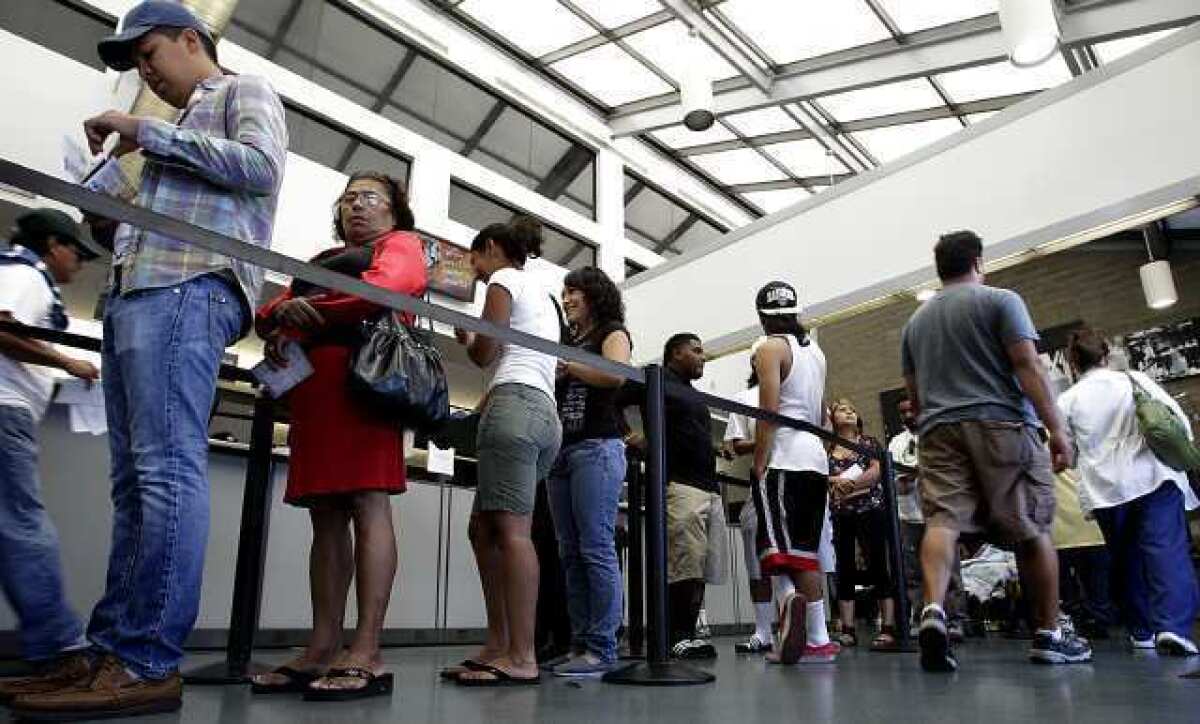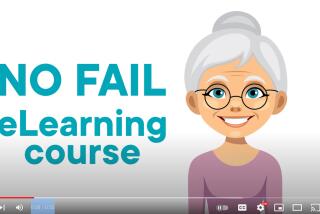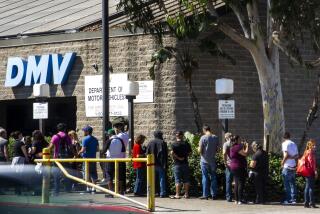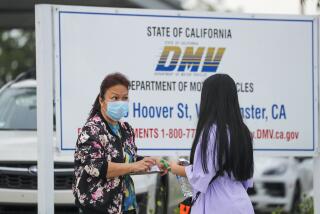California DMV is scaling back over coronavirus. Some employees say it’s not enough

To slow the spread of COVID-19, the California Department of Motor Vehicles has dramatically restricted customer visits to its field offices, barring people who do not have appointments and warning that no new slots to appear in person are currently available.
But some field office employees who spoke to The Times on condition of anonymity raised concerns that the measures don’t go far enough, leaving staff and customers vulnerable to infection while offices remain open.
The employees also say that a recent decision by the DMV to quietly waive knowledge tests that had previously been required for license renewals and those with an out of state license could potentially put the public at risk.
A memo sent to employees last Tuesday by Sonia Huestis, identified on the agency’s website as the deputy director of the customer services division, expanded the number of those eligible to forgo the in-person test. Tests may now be waived for those who are maintaining their driver’s license class or endorsement, or those who can provide proof of an equivalent out-of-state license.
Under current rules outlined in the California Driver Handbook, people who may be eligible to forgo the written test and renew their license by mail or online include those whose license expired before they turned 70, who don’t have a probationary or suspended license, and who have not violated a written promise to appear in court in the last two year.
The change also covers applicants who previously failed the knowledge test multiple times.
“They’re saying we’re being kept open because we’re an essential part of the community,” said an employee who works at a DMV office in Salinas and requested anonymity to speak freely about the agency. “How can we be essential when we’re not protecting the public? We’re putting the public in danger by doing this.”
Last week, the employee helped process license paperwork for two customers, 75 and 77. One had previously failed the written test five times and the other had failed seven times.
Aware of the policy change, she brought the cases to her manager, asking whether she should waive tests for people who had failed so many times.
“We were told, ‘Nope, just give them their license,” the employee said. “We issued their license for another five years.”
Meanwhile, a DMV employee in the San Joaquin Valley said her office waived about a half-dozen tests last week, including those for multiple people who had been cited for driving under the influence.
“All of this is baffling to me,” said the employee, who also agreed to speak on condition of anonymity. “They want to keep their license, but maybe they shouldn’t have it. … [The test is] only just a barrier, but that’s what it’s for.”
In a written statement, DMV spokeswoman Anita Gore said that the new policy was one of many temporary actions that the DMV has been taking to protect the health of customers and employees during the pandemic.
“Since the knowledge test is typically administered on a touchscreen in a close-quartered testing area, waiving this requirement promotes social distancing and reduces the possibility of a surface transmission of the virus,” she wrote.
Najmedin Meshkati, a professor and safety expert at USC’s Viterbi School of Engineering, said the written tests are in place for a reason.
“Those people that have some issues with [their] driver’s license need to revisit those instructions and rules and regulations,” he said. “It [the change] sends the message that there is no need to study and learn that.”
The DMV has more than 170 field offices, and some 27 million drivers have California licenses while 35 million vehicles are registered with the state. Registrations and many other tasks can be done online, through the mail, at one of the 365 kiosks statewide or in select businesses that have DMV services.
Since the agency moved to appointment-only service on March 19, the number of customers visiting field offices has dropped from approximately 95,000 per day a month ago to about 17,000 per day, Gore said, a move that has “significantly reduced the number of people in our offices at any given time and promotes social distancing recommendations.”
The DMV received some relief Thursday when the U.S. Department of Homeland Security delayed the deadline for issuing Real IDs to millions of Californians who don’t have them for one year, until Oct. 1, 2021. The postponement relieves pressure on the agency to get Californians into field offices now.
Obtaining a federally required Real ID license or card must be done in a DMV office. The DMV has been struggling to issue the licenses to millions of Californians before an Oct. 1 deadline this year, after which time the new identification would have been required to board domestic airline flights.
“The federal, state and local response to the spread of coronavirus here in the United States necessitates a delay in the deadline,” acting Homeland Security Secretary Chad Wolf said in a statement.
For existing appointments, the DMV is giving priority to those who need to complete transactions that can only be accomplished at a field office, including the reinstatement of a suspended or revoked driver license, adding an endorsement to a commercial driver license, special registration transactions to reclaim an impounded vehicle and issuing identification to underserved populations, Gore said.
The scaling back of in-person operations comes as DMV employees and customers alike have expressed anxiety over the risks of working in or visiting field offices. Karen Patterson, 73, of Manhattan Beach said she received a pre-recorded voice message on Monday confirming an appointment in San Pedro next weekend where she expected to take a written test to renew her license.
Patterson had already decided she wouldn’t be going. Her driver’s license will expire on April 15, but she worried that leaving her home and going into the DMV office might put her at risk for contracting COVID-19.
“It just feels counter-intuitive to how we are supposed to be taking care of ourselves,” she said. “It seems that under the circumstances, you could take that test online rather than submit yourself to being so vulnerable to the virus.”
The DMV also has canceled all driving tests, suspended extended morning hours and Saturday service at its field offices, and requested law enforcementto exercise discretion for 60 days in their enforcement of driving with a recently expired license or vehicle registration.
Among those who will benefit from the grace period are people whose vehicle registration must be renewed in person because they have outdated insurance information, those whose registration has been expired for 90 days or more, and those with cars that have smog issues.
The San Joaquin Valley DMV employee said that the extension provides another reason to close fieldoffices.
“There isn’t really a need for us to be there and risk our health and our families’ health and the very public we’re serving’s health if we have these extensions implemented,” she said.
California’s Real ID policy requires an office visit for a new photo, presentation of documents and a thumbprint, Gore said. With millions of Californians still without a Real ID, the DMV has decided to honor the existing appointments for the new identification cards but not to approve any new ones for the time being, Gore said.
As DMV field offices have scaled back their visits, some agency employees have voiced concern over risking their health while working in offices in close proximity to customers who may have been exposed to COVID-19. The DMV closed its Riverside call center — one of three in the state — for a cleaning Tuesday after an employee tested positive for COVID-19, but the center was reopened Wednesday, a representative said.
Following the governor’s stay-at-home order, DMV employees received letters that they’ve been instructed to show law enforcement officials if they are stopped and asked why they are not at home. The letters state that the DMV has been identified by the governor as “a vital public entity required to continue core operations” and that the employee named in the letter is required to report to their work site on a daily basis.
“Your dedication to public service in these trying and uncertain times continues to amaze me,” wrote DMV Director Steve Gordon in a March 23 memo to employees. “I hope you know how important you are to California and how much I appreciate all you do.”
Gov. Gavin Newsom has also offered assurances to leaders of the Service Employees International Union, Local 1000, which represents DMV employees, that protection of state workers is a priority.
The new policy limiting visits to the DMV offices was welcomed by Local 1000 President Yvonne R. Walker.
“We feel the DMV did the right thing to limit transmission of COVID-19 and flatten the curve,” Walker said, “and we fully support their efforts to do so.”
Assemblyman Phil Ting (D-San Francisco) said that DMV officials need to determine whether the agency can continue to serve people at a safe distance while respecting orders from the Department of Health.
“I know the DMV is deemed an essential service. And the question is which services are the most essential and how many can be done remotely or virtually and which ones require people to come in,” said Ting, chairman of the Assembly Budget Committee, which has held hearings on DMV operations.
But many DMV employees have said that the agency should close its offices entirely given efforts to move more of its services online.
The San Joaquin Valley employee said she has gloves at work and has been instructed to disinfect her station with Clorox wipes after each customer. But her customers, she said, often have trouble maintaining their distance.
“Our customers are not six feet from us,” she said. “They’re right at our counter at about two feet from us. A lot of them are elderly and a lot of them hover.”
She said she had been told she could opt to stay home if she felt her health was at risk but that employees without sick leave or vacation time left to use would not be paid. As a single mom who supports a 23-year-old daughter in college, the employee felt she had no choice but to continue going in.
Some employees have decided to stop going to work at the expense of their livelihood. A manager at a DMV field office in San Jose told The Times that he stopped going to work shortly after ordering masks, hand sanitizer, gloves and disinfecting wipes for his office in late February. He worried about contracting the virus even with protective equipment and passing it on to his 8-year-old daughter, who is now spending her days at home.
“The public, you have to interact with them face to face,” he said. “They have to be at your counter when you sign documents. They have to hand you the money.”
He’s part of a text message group in which employees from various DMV offices have reported running low on equipment and are sharing worries about having few pairs of gloves left or needing to use sanitizer sparingly.
“Everyone is just concerned that they are bringing it home to their family,” the DMV manager said. “Other locations are closed down — DMV should be one of them.”
More to Read
Sign up for Essential California
The most important California stories and recommendations in your inbox every morning.
You may occasionally receive promotional content from the Los Angeles Times.












